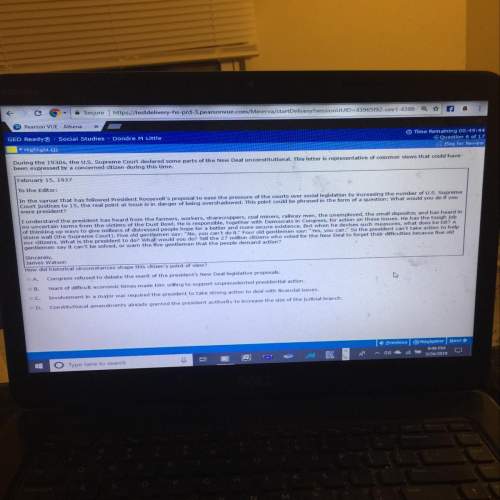
Why were the American Rangers willing to climb the cliff at Normandy despite
strong opposition?
Al They could hear the crack of rifle fire.
B\ They were fighting for freedom in Europe.
C\ They were fighting for an alliance with Russia.
D\ They could see the terrible shadow above them.

Answers: 1


Another question on History

History, 21.06.2019 15:00
How did the roaring 20s mark the end of the progressive era? a. mass production reduced wealth disparity and turned public opinion pro business b. labor unions won big legislative gains in workers rights and disbanded c. public officials cut taxes on businesses and reduced spending on services d. america increasing influence in world affairs redirected public attention to foreign policy
Answers: 2

History, 21.06.2019 19:30
In the decision for dred scott vs.sanford, (1857) in which a slave petitioned for his freedom in a st. louis court, on the grounds that his owner had taken him into free territory, and thus he ought no longer be regarded as possessing "slave" status, but should be regarded as a free man, the court decided as follows (excerpt): "in the circuit courts of the united states, the record must show that the case is one in which by the constitution and laws of the united states, the court had jurisdiction--and if this does not appear, and the court gives judgment either for plaintiff or defendant, it is error, and the judgment must be reversed by this court--and the parties cannot by consent waive the objection to the jurisdiction of the circuit court. a free negro of the african race, whose ancestors were brought to this country and sold as slaves, is not a 'citizen' within the meaning of the constitution of the united states. when the constitution was adopted, they were not regarded in any of the states as members of the community which constituted the state, and were not numbered among its 'people or citizen.' consequently, the special rights and immunities guarantied to citizens do not apply to them. and not being "citizens" within the meaning of the constitution, they are not entitled to sue in that character in a court of the united states, and the circuit court has not jurisdiction in such a suit. the only two clauses in the constitution which point to this race, treat them as persons whom it was morally lawful to deal in as articles of property and to hold as slaves. since the adoption of the constitution of the united states, no state can by any subsequent law make a foreigner or any other description of persons citizens of the united states, nor entitle them to the rights and privileges secured to citizens by that instrument." why does the court say that the petitioning party in this case had no right to sue for his freedom? a) because he is too young b) because he is from a different state c) because he is "of the african race" with enslaved ancestors d) because he is, properly speaking, within his owner's jurisdiction
Answers: 1

History, 21.06.2019 22:00
Step 1 - choose only one of the two options. • in a word document, create an " action plan" to move the bus stop pick - up/ drop - off point to a new location. • in a word document, create an " action plan" to have road signs and speed limits installed at this location. (step 2) in a word document, draft a letter that explains why you are taking this action. you may use fictitious data as long as it is reasonably believable. (step 3) in a word document, create a petition that voters can sign to go along with your letter of explanation. (step 4) in a word document, explain how you would implement this action plan to all voters affected by your action plan. ( there's much territory to cover.
Answers: 3

History, 22.06.2019 01:30
Will give brainliest and a will put up a free point questionthe following question refers to a hypothetical situation. the 2010 supreme court case, wagner v. tritch, involves the illegal distribution of copyrighted material to foreign consumers via the internet, which is a new area of law. the 9-0, unanimous vote on the court is set to overturn the lower appellate court decision that augustus tritch was liable for millions of dollars to the plaintiff, frederick von wagner, for illegally distributing his book to overseas customers. now that the court has voted on the case, explain what must happen next? describe the different types of opinions that could come from the court.
Answers: 2
You know the right answer?
Why were the American Rangers willing to climb the cliff at Normandy despite
strong opposition?
Questions




Mathematics, 04.11.2019 20:31

Biology, 04.11.2019 20:31

Mathematics, 04.11.2019 20:31

Geography, 04.11.2019 20:31

Mathematics, 04.11.2019 20:31






Mathematics, 04.11.2019 20:31

History, 04.11.2019 20:31

French, 04.11.2019 20:31

World Languages, 04.11.2019 20:31


Biology, 04.11.2019 20:31




